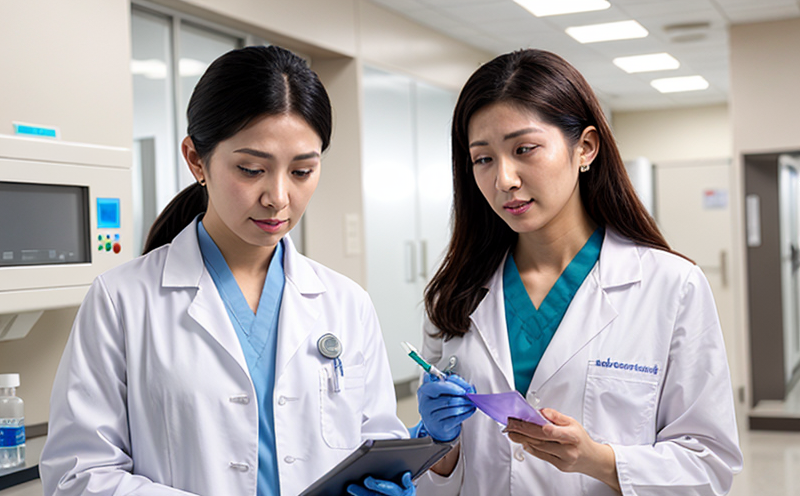Comparative Pharmacokinetics Testing of Biosimilars
In today’s pharmaceutical landscape, biosimilars play a crucial role in providing cost-effective alternatives to branded biologics. Comparative pharmacokinetics testing is pivotal for ensuring the safety and efficacy of these products during development and post-marketing surveillance.
The primary goal of comparative pharmacokinetics testing for biosimilars is to demonstrate that there are no clinically meaningful differences between the biosimilar product and its reference biologic. This involves a comprehensive evaluation of both the bioanalytical performance and the biological activity of the molecules under investigation.
Our laboratory specializes in conducting these tests using cutting-edge technology and following stringent international standards such as ISO, ICH (International Council for Harmonisation), and FDA guidelines. The testing process encompasses various stages, including sample preparation, assay development, and data analysis, all tailored to meet the unique requirements of biosimilar products.
The complexity arises from the fact that biologics are large, complex molecules with structural heterogeneity and potential post-translational modifications. These characteristics necessitate rigorous testing methods to ensure consistency between the biosimilar and its reference product. Our laboratory employs advanced techniques such as liquid chromatography-mass spectrometry (LC-MS/MS), enzyme-linked immunosorbent assays (ELISAs), and bioanalytical methods to assess these factors.
From a regulatory perspective, comparative pharmacokinetics testing is essential for obtaining approval from the U.S. Food and Drug Administration (FDA) or other global health authorities. Compliance with international standards ensures that our clients can confidently market their products in various markets worldwide.
The process typically begins with the selection of appropriate biomarkers to assess the drug’s performance over time. These biomarkers are chosen based on their relevance to the biological activity and clinical outcomes associated with the specific biologic product being tested. Our team works closely with our clients to determine which markers are most suitable for their particular biosimilar candidate.
Following sample preparation, we develop robust bioanalytical methods that can accurately measure the concentration of the target protein in various matrices, including serum or plasma samples from clinical trial participants. These methods must be validated according to established protocols to ensure accuracy and precision.
Data analysis plays a critical role in interpreting the results obtained during comparative pharmacokinetics testing. Our experts use sophisticated software tools to analyze the time course of drug concentrations, assess variability among subjects, and compare these data against those from the reference product. This allows us to identify any potential differences that could impact clinical outcomes.
The comprehensive nature of this service underscores its importance in ensuring the safety and efficacy of biosimilars. By providing reliable comparative pharmacokinetic data, we help our clients navigate the regulatory landscape confidently while minimizing risks associated with product development.
Why It Matters
The importance of comparative pharmacokinetics testing cannot be overstated. This service ensures that biosimilars meet rigorous standards set forth by regulatory bodies, thereby fostering trust among healthcare providers and patients alike.
One key aspect is the demonstration of interchangeability between a biosimilar and its reference product. Interchangeability implies that switching from one formulation to another would not pose additional safety risks for patients already stable on therapy with the reference biologic. Establishing this interchangeability requires extensive comparative pharmacokinetics testing.
Another critical benefit lies in reducing costs without compromising quality. Biosimilars offer significant savings compared to their branded counterparts, making them an attractive option for healthcare systems and insurers. However, ensuring that these cost-saving measures do not compromise patient safety is paramount.
Moreover, comparative pharmacokinetics testing supports ongoing post-market surveillance of biosimilar products. Even after a product has been approved, continuous monitoring helps identify any emerging issues related to long-term use or changes in manufacturing processes.
Benefits
- Regulatory Approval: Ensures compliance with stringent regulatory requirements for biosimilars.
- Patient Safety: Guarantees that there are no clinically meaningful differences between the biosimilar and its reference product.
- Cost Efficiency: Provides a cost-effective alternative to branded biologics while maintaining high quality standards.
- Risk Reduction: Minimizes potential risks associated with product development and post-market surveillance.
- Innovation Support: Facilitates the introduction of new biosimilar products into the market, promoting innovation within the industry.
Competitive Advantage and Market Impact
Our laboratory’s expertise in comparative pharmacokinetics testing provides a significant competitive advantage in the biopharmaceutical sector. By offering comprehensive, accurate, and reliable data, we position our clients ahead of competitors who may not have access to such advanced services.
- Enhanced Reputation: Clients benefit from an enhanced reputation for delivering high-quality biosimilars backed by robust scientific evidence.
- Faster Time-to-Market: Efficient testing processes lead to quicker approvals, enabling faster entry into the market and capturing more market share.
- Better Decision Making: Accurate data informs better decisions regarding product development strategies and marketing plans.





